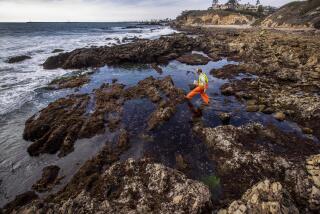House-Senate Conferees OK Oil Spill Bill, Paving Way to End Years-Long Stalemate
- Share via
WASHINGTON — House and Senate negotiators Thursday approved a major bill to clean up and prevent oil spills, paving the way for final passage of the long stalemated and still controversial legislation as early as next week.
The far-reaching bill requires new ships to be double-hulled, sets up a billion-dollar trust fund and allows states to keep unlimited liability laws already on their books or pass new ones.
In an ending that was almost an anticlimax to more than 15 years of legislative wrangling over the oil spill issue, the conferees reconciled the last of the differences between the House and Senate versions of the bill by unanimous voice vote.
The omnibus legislation, one of two major environmental bills that Congress is expected to pass this year, now goes back to the House and Senate for final approval. Rep. Walter B. Jones (D-N.C.), chairman of the House Merchant Marine and Fisheries Committee, said that he expects both chambers to pass the bill before Congress begins its August recess next week.
Despite the inclusion of several provisions that had been bitterly contested by the Administration and by the oil and shipping industries, President Bush is expected to sign the legislation into law without further delay.
The bill approved by the House and Senate conferees would reform federal laws dealing with oil spill prevention, cleanup and compensation in far-reaching ways. It has been hailed by environmentalists but denounced by oil companies and shippers as exposing them to possibly open-ended claims in the event of a large spill.
A major provision agreed to Thursday raises the limit of a shipper’s liability in the event of a large oil spill to an amount equal to $1,200 per gross ton of the tanker involved. The largest supertankers would face maximum liabilities of more than $240 million.
In what was seen as a key compromise, the House conferees agreed to drop a provision in their bill that would have extended the liability to cargo owners as well as shippers. In return, the Senate negotiators accepted the higher House liability limit of $1,200 per gross ton--all of it to be borne by the shipper.
The limits do not apply, however, to spills caused by gross negligence or criminal misconduct on the part of the spiller.
The bill also establishes a $1-billion trust fund, financed by industry contributions and a 5-cent-per-barrel oil tax, to help cover cleanup costs beyond what the shipper would pay. But under another compromise struck Thursday, states could claim a maximum of $500 million from the fund for damage to natural resources.
In another major provision aimed at preventing spills, the bill requires that, beginning in 1995, all new tankers and seagoing barges serving U.S. ports be equipped with double hulls. With a few exceptions, all tankers, including older vessels now in service, would have to meet that requirement by the year 2010.
The provision would require a major retrofitting of the shipping industry.
But industry’s greatest opposition was directed at a provision that allows states to keep or institute unlimited liability laws. California and most other coastal states already have such laws.
It was that fight that for years stymied attempts to enact oil spill liability legislation in the House.
However, the Exxon Valdez disaster in March, 1989, and the series of costly spills that followed it, generated the public outrage and the political momentum to overcome the legislative stalemate, resulting in the passage of the House bill late last year. The Senate version was approved soon after the Exxon Valdez spill.
A final effort to shield shippers from unlimited state liability laws was defeated last month, when the conferees deleted a provision in the House bill that would have provided for U.S. participation in an international treaty setting lower limits.
“What this means is that the liability limits set in this bill are virtually meaningless. This bill won’t work because the real issue remains the state laws,” a shipping industry lobbyist said.
The shippers have argued that continued exposure to unlimited liability claims will raise insurance rates to prohibitively high levels and force many of them out of the U.S. market.
Environmentalists, however, discount these claims, noting that the shippers have operated for years under the shadow of the state laws, which the bill does not change.
“We’re not happy with everything in the bill. We felt it could have been stronger. But overall we like it,” said Clifton Curtiss, a lobbyist for Friends of the Earth.
More to Read
Get the L.A. Times Politics newsletter
Deeply reported insights into legislation, politics and policy from Sacramento, Washington and beyond. In your inbox twice per week.
You may occasionally receive promotional content from the Los Angeles Times.










